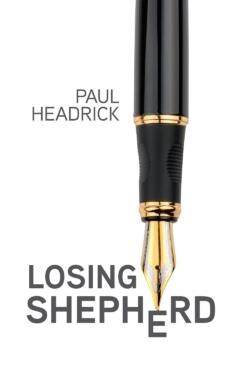1423 Scary stuff of real maturity
Losing Shepherd
by Paul Headrick
Winnipeg: Signature Editions, 2022
$22.95 / 9781773240961
Reviewed by Brett Josef Grubisic
*
 Over summers once upon a time, my sister and I would spend a month of every school break at my grandmother’s home, an alfalfa farm in Oliver, BC. Each vacation started off at the bus stop in Mission. We’d climb aboard with our eyes scouring interior gloom for a pair of adjoined seats and usually settle for two empty seats in the same row. Our fervent hope was to avoid scary delinquents parked in the smoke-hazed rear (we envisioned inventively sly bullies or roaming hands) as well as the dreaded old-timers everywhere else whose nosy questions and snippy judgments were a foregone conclusion. Of equal concern: long-winded retirees who relished a captive audience they could regale with reminiscences about their own youth, when people knew their places, everything cost a nickel, and no televisions reduced promising minds to worthless mush. On jinxed trips, we ate lunch at the Princeton bus depot cafeteria. Between mouthfuls we one-upped each other with horror stories from the previous three hours. When our grandmother picked us up in Oliver we’d tell her the ride had been fine. She was a widow and had scraped by in Alberta during the Depression. We knew she had no patience for our nonsense.
Over summers once upon a time, my sister and I would spend a month of every school break at my grandmother’s home, an alfalfa farm in Oliver, BC. Each vacation started off at the bus stop in Mission. We’d climb aboard with our eyes scouring interior gloom for a pair of adjoined seats and usually settle for two empty seats in the same row. Our fervent hope was to avoid scary delinquents parked in the smoke-hazed rear (we envisioned inventively sly bullies or roaming hands) as well as the dreaded old-timers everywhere else whose nosy questions and snippy judgments were a foregone conclusion. Of equal concern: long-winded retirees who relished a captive audience they could regale with reminiscences about their own youth, when people knew their places, everything cost a nickel, and no televisions reduced promising minds to worthless mush. On jinxed trips, we ate lunch at the Princeton bus depot cafeteria. Between mouthfuls we one-upped each other with horror stories from the previous three hours. When our grandmother picked us up in Oliver we’d tell her the ride had been fine. She was a widow and had scraped by in Alberta during the Depression. We knew she had no patience for our nonsense.
I hadn’t thought of those trips in years but they surfaced now and then as I read Losing Shepherd. The kid who squirmed and sighed upon hearing the phrase “When I was your age…” existed decades in the past, yes, but his middle-aged counterpart reacted similarly to Gordon Bridge, the self-involved narrator of Vancouver-based Paul Headrick’s second novel. While others may regard Bridge as appealing, for me his voice, personality, and narrating choices were hard to stomach. With Losing Shepherd, I could not wait to get off the bus.

On paper, however, Bridge makes perfect sense, as does his redemptive quest. The man’s well-read, observant, and articulate: he thinks and composes fine sentences for a living. He appears capable of self-analysis and psychological growth. His “emotional stupidity” is an ongoing concern but, he acknowledges more than once, he’s working on it.
In theory, then, any project Bridge applies his intellect to might be cathartic for himself and edifying for readers: by his own account he’s lauded for good reason. If, for example, he reflected on his culpability for an “incomprehensible betrayal” his pages could shed light on humanity’s contradictory impulses. Or fruitfully meditate on moral quandaries.
Regrettably, Bridge is not fully up to the task he’s assigned to himself.
He’s got other, distracting matters on his mind, it’s true. An agent to appease, books to start and finish, a career to finesse, a house to buy and renovate, flights to take, a divorce to finalize, and parents whose health is no longer certain.
Bridge is no ivory tower thinker. He’s a recognized luxury brand, a serious “celebrity novelist,” as he mentions. (And, in case that stature slips the minds of his guaranteed readership, there’s “famous, still-sort-of-young Gordon Bridge,” “[l]iterary celebrity,” “famous novelist,” and “star.”) This novelist, poet, and essayist doesn’t pine for acclaim, prizes, access, wealth, and privilege. He’s got them. He’s an inevitable presence during literary prize season — “Governor General’s, Giller, Booker: finalist every time” — and routinely invited to share his opinions and bestselling words.
For a narrative by a supposed deep-thinking penitent, though, there’s a glut of superfluous material about the daily neuroses of a narcissistic literary A-lister.
Bridge states that this time around (having just published a “New York novel” that, he doesn’t fail to note, garnered praise far and wide) he’s writing to make amends, to figure stuff out, and to achieve some species of closure. Losing Shepherd, then, is a novel about Gordon Bridge that’s also a memoir by Gordon Bridge that reveals the author’s private agonies and immense contradictions. But this “star” (would any literary icon dare to mention — never mind boast about — their Olympian stature in print, even once?) reserves so many pages to recount quotidian woes and complaints that the ostensible goal fades from sight.
The resulting memoir has a Frankensteinian quality; it’s unwieldy, a visible patchwork that aims for seamless unity. Bridge-the-penitential-supplicant is visible, yes, but the trials and tribulations of Bridge-the-hassled-celebrity frequently intrude into the narrative and detract the writer from the goal he’s formally announced. It’s like Bridge is meditating but keeps thinking about what to eat for lunch and whether to drive to a car wash afterwards.
*

Decades before, Bridge — “notoriously skinny” and “stalled at five-four” — published an unfair and brutal review of his best friend’s novel. The disastrous result was the total loss of a close friendship with Taylor, a “literary comrade” Bridge met in high school, when they were “[b]ookish, socially limited, [and] overcompensating with pretensions to superior feeling.” Until Bridge “murdered the friendship,” the men were both rivalrous and supportive. The review hurt Taylor and caused a “literary paralysis” and debilitating physical problems for Bridge.
As Bridge recalls his years as a fledgling writer and the ensuing problems before and after the review, Losing Shepherd has a dynamic flow. Likewise, as Bridge sketches his fraught relationship with his mother (“an obscure, underpaid book reviewer”), the novel proves as engrossing as the character himself. Headrick’s portraits of a marriage that falters for years and a new romance are similarly absorbing.
Still, what’s notable is how much Bridge returns to himself. That’s virtually a given in first-person narration, yet the outside world seems of interest to him primarily as source material. When the Madrid train bombing of 2004 inspires a book, the emphasis of Bridge’s recollection is less on the bombing or the lives lost than on how the event led to the book and how people reacted to the book. Or, after his son lectured Bridge passionately about unsustainable commercial fishing practices, he remarks, “I turned, lost my balance, staggered and recovered. And I knew. Gift from Gavin. Oh Gavin, ever-generous younger son.” Gavin’s outburst inspired a novel. Or, following Bridge Sr.’s funeral, which Taylor attended, the penitential celebrity observes, “He’d ruined it, showing up like that.”
Later, once his mother wakes up from a coma in the novel’s present day, Bridge wonders about his motivation for the scathing review from so long ago. He convinces himself he wrote it for his mother and decides, “I’d wait for a lucid moment, and I’d confront her.” This pattern continues. As she sleeps: “For ten hours Mum lay unmoving, eyes closed, breathing gradually accelerating. I tried the words out, said them out loud, not in anger, but gently. ‘Mum, I did it for you. I thought I had to, for you.’” A few pages on, Bridge remarks:
My progress with the post-death bureaucracy clicked along through a predictable funk, thanks to my recent rehearsal with Dad. Such a dull, protracted anticlimax reminded me of the review of Volley through Eternity I liked the best, the smartest, written by a University of Texas prof with a book blog.
He then quotes a half-page of the review.
Bridge talks about the “scary stuff of real maturity” and claims “I’m not the same person I was when I began this memoir.” Based on the memoir Bridge sends to his agent on the final page (which is of course Losing Shepherd) change is neither easy nor assured.
*

My Two-Faced Luck, the fifth novel by Salt Spring Islander Brett Josef Grubisic, was published in 2021 with Now or Never Publishing — and reviewed here by Geoffrey Morrison. A previous book, Oldness; or, the Last-Ditch Efforts of Marcus O, was reviewed by Dustin Cole. Editor’s note: Brett Josef Grubisic has also reviewed books by Christopher Evans, Brad Fraser, Robert James O’Brien, Kevin Holowack, Sarah Mintz, Cedar Bowers, Glen Huser, Dustin Cole and George Ilsley for The British Columbia Review.
*
The British Columbia Review
Publisher and Editor: Richard Mackie
Formerly The Ormsby Review, The British Columbia Review is an on-line journal service for BC writers and readers. The Advisory Board consists of Jean Barman, Wade Davis, Robin Fisher, Cole Harris, Hugh Johnston, Kathy Mezei, Patricia Roy, Maria Tippett, and Graeme Wynn. Provincial Government Patron (since September 2018): Creative BC. Honorary Patron: Yosef Wosk. Scholarly Patron: SFU Graduate Liberal Studies.
“Only connect.” – E.M. Forster
6 comments on “1423 Scary stuff of real maturity”